A few days ago
Foreign Policy published an article suggesting that Beijing Is Shooting Its Own
Foot in Hong Kong Political paranoia is making it hard for the Chinese
Communist Party to sell its own narrative, today China freed a British
consulate worker whose detention only helped to fuel tension.
Last night, a
human chain stretched for kilometres across both
sides of Hong Kong harbour as people turned out for a
peaceful demonstration inspired by anti-Soviet protesters in Estonia, Latvia
and Lithuania in 1989 that became known as the Baltic Way (also
pictured on).
It is worthwhile
however to look at this in a larger context of what is happening with mainland
China as a whole while expanding on my earlier observations about the development of China's new nationalism.
Some of the
observations that can be made about about China today
is that the country has just experienced a period of economic growth the likes
of which the world had never before seen to which we can ad that China is
ruled, increasingly dictatorially. There are also indications that the party
wants to bring private enterprise to heel, by intervening more directly in how
businesses are run.
Behind these policies
lies a growing insistence that China’s model of development is superior to the
West’s. Thus in the above-quoted speech, Xi claimed that “the Chinese nation, with
an entirely new posture, now stands tall and firm in the East.”
Hong Kong in the light of chinese
nationalism
The report 0n 29 July
about a mainland Chinese man pushing a female Hong Kong overseas student to the
ground at the University of Auckland in New Zealand may seem inconspicuous on
its own. But it’s a worrying sign of how Beijing has turned Hong Kong’s
protests into an interethnic conflict, one that could flare into worse
violence.
Also by putting a heavy
emphasis on the discolored national emblem through state-controlled media,
the Chinese government is deliberately whipping up nationalist fervor among
mainland Chinese citizens and is granting license for people to act against
imagined enemies of China. This form of political
and psychological
warfare has the potential to lead to even greater tragedy than a
conventional military crackdown, as it could poison the relationship between
Hong Kongers and mainland Chinese citizens.
Hong Kong students
abroad have described an atmosphere of fear, intimidation and vitriol in
dealing with ultra-nationalistic mainland Chinese since the city’s
anti-government protests broke out.
For example in
Vancouver Canadian police needed to escort worshippers as ‘bullying’ pro-China
protesters surround church holding prayers for Hong Kong:
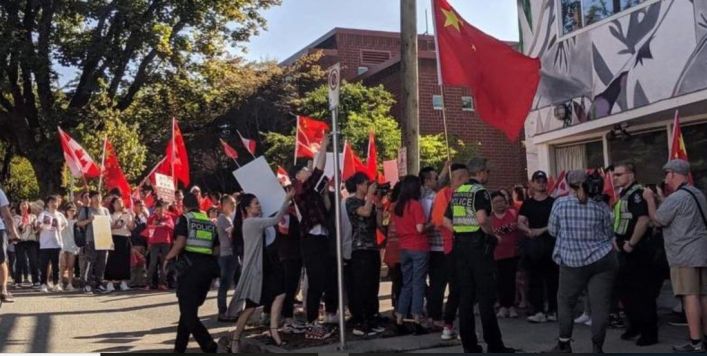
Chris Chiu said the
incident had left him shaken and fearing for the worshippers’ safety. “There
were VPD [Vancouver Police Department] outside warding off people from the
area, there were people waving Chinese flags,” Chiu said. “They
were obviously here trying to intimidate us.”
Elsewhere in Melbourne
fights broke out, where
a pro-Beijing demonstrator attacked an ABC reporter.
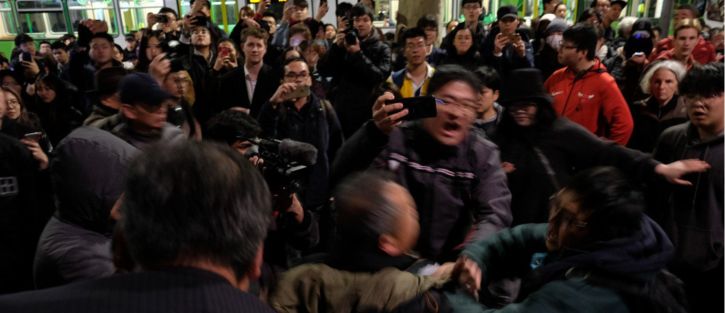
An article in the NYT
titled Chinese
Nationalists Bring Threat of Violence to Australia Universities describes
Chinese nationalist attacked an abcnews journalist in
Melbourne. The pro-Hong Kong rally turned violent as hundreds of demonstrators
clashed with more than 100 pro-China protesters. Four MPs have voiced concerns
about the
influence the Chinese government has. And as is exemplified by the above
cited NYT article in the case of organizing pro-Beijing rallies the focus has
often been on Chinese Nationalist outfits like the worldwide
Confucius Institutes.
China's new nationalism
is the particular view of history endorsed by the Chinese leadership, which
sees the history of China from the mid-nineteenth century to the Communists’
coming to power in 1949 as an endless series of humiliations at the hands of
foreign powers. While there is some truth to this version of events, the CCP
also makes the frightening claim that the party itself is the only thing
standing between the Chinese and further exploitation. Since it would be
untenable for the party to argue that the country needs dictatorship because
the Chinese are singularly unsuited to governing themselves, it must claim that
the centralization of power in the party’s hands is necessary for protection
against abuse by foreigners.
Another troubling
aspect of nationalism in China today is that the country is a de facto empire
that tries to behave as if it were a nation-state. More than 40 percent of
China’s territory, Inner Mongolia, Tibet, Xinjiang, was originally populated by people who do
not see themselves as Chinese. Although the Chinese government grants special
rights to these “minority nationalities,”
their homelands have been subsumed into a new concept of a Chinese nation and
have gradually been taken over by the 98 percent of the population who are
ethnically Chinese (or Han, even this refers to
an earlier very different empire). Those who resist end up in prison camps,
just as did those who argued for real self-government within the Soviet empire.
Externally, the
Chinese government sustains a dystopia, next door in North Korea, and routinely
menaces its neighbors, including the democratic government in Taiwan, which
Beijing views as a breakaway province. Much of this is not to China’s advantage
politically or diplomatically. Its militarization of
faraway islets in the South China Sea, its contest
with Japan over the Senkaku/Diaoyu Islands, and its attempts at punishing
South Korea over the acquisition of advanced missile defenses from the United
States have all backfired: East Asia is much warier of Chinese aims today than
it was a decade ago. (The percentage of South Koreans, for example, who viewed
China’s rise favorably fell from 66 percent in 2002 to 34 percent in 2017,
according to the Pew Research Center.) Despite this dip in China’s popularity,
people across the region overwhelmingly believe that China will be the
predominant regional power in the future and that they had better get ready.
As for Hong Kong, the
economist recently spotted Chinese new nationalism in its
dismay on Weibo and WeChat even in reference to certain Western brands.
Whereby entertainers such as Liu
Yifei and Jackie Chan also took nationalist positions vis a vis the Hong
Kong protests.
Meanwhile the brief
respite from violence has come to an end today, with
police firing tear gas at demonstrators as the city's protests enter their
12th weekend. Protesters took to Kwun Tong district in the city's east on
Saturday, reiterating the
five demands that have emerged during this pro-democracy movement, and
adding an additional issue: the government's installation
of "smart" environmental monitoring lampposts, which have sparked
privacy concerns. The protest movement still appears to have broad support,
with thousands, including families, lawyers, accountants and young and old
people, taking to the streets in anti-government rallies today.
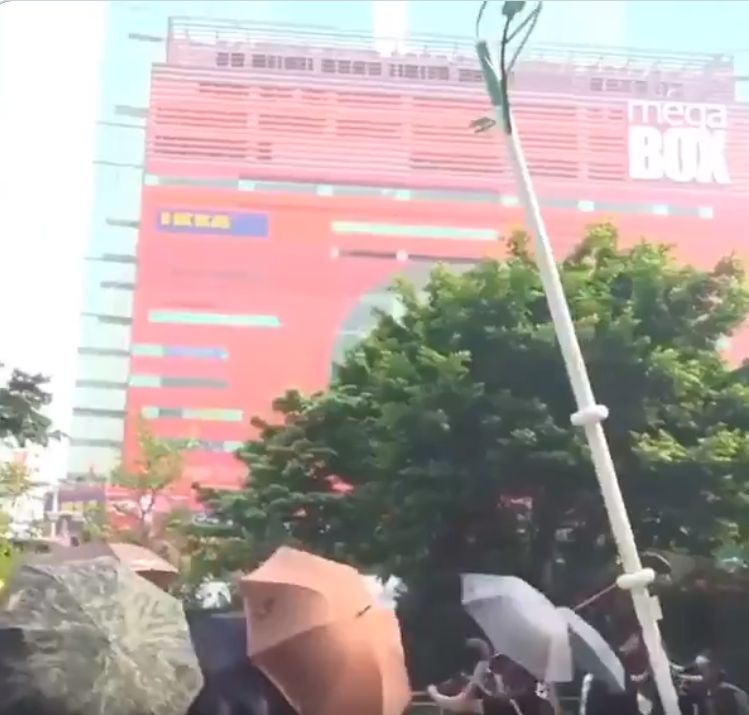
There are more protest scheduled for tomorrow, Sunday.
As to how all of this
will end, it is unclear what will happen but while the Hong Kong Government so
far has denied this 'will' happen, there is still 'some' possibility that Beijing at one point could cite Article 18 of the
basic law, which permits the National People's Congress to impose a curfew
if the Hong Kong government cannot restore order, arguing that the right to
impose a curfew implies the right to police a curfew. If it did, however, local
police would probably be in command of any People's Armed Police forces.
With policeman who
are dressed like the are part of a military style war and demonstrators who
before they as always retreat attempt at times to fight back today is another
day that is leading to escalation.
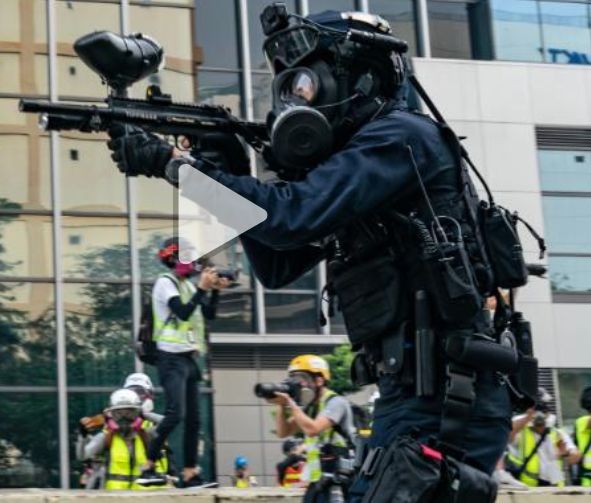
Update 29
Aug. 2019: The rotation of
fresh Chinese military troops to the Hong Kong garrison sparked widespread
concern Thursday, demonstrating how on edge the city is ahead of a thirteenth
consecutive weekend of anti-government
protests. In a statement, China's military said the "annual normal
routine action" had been carried out with the approval of the Central
Military Commission and the troops would "resolutely safeguard national
sovereignty, security, and development interests, effectively perform Hong
Kong's defense duties, and safeguard Hong Kong's prosperity."
The People's
Liberation Army troop movements were carried out in the dead of the night,
and took place at the same time as a rotation of the garrison in neighboring
Macao. They were announced
by Chinese state media early Thursday morning. The move also came as Chief
Executive Carrie Lam would
not rule out using emergency powers-- which would give her the right to
pass new laws without the approval of legislators, if violent protests
continue.
Police have denied
permission for a major protest planned by the Civil Human Rights Front on
Saturday. The CHRF previously organized three peaceful marches it said
attracted more than a million participants. Organizers said they are appealing
the police decision. While fears about a military crackdown have often focused
on visions of PLA tanks crossing the border, the military has had a major
presence in Hong Kong since the city was handed over from British to Chinese
control in 1997.
The 6,000-strong
garrison largely
avoids public view, however, aside from displays to mark key anniversaries
or the visits of Chinese officials, such as when President Xi Jinping inspected
troops in 2017 to mark 20 years of rule from Beijing. Under the city's
constitution, the Hong Kong government can request the assistance of the
garrison "in the maintenance of public order and in disaster relief."
Administration and
police officials have repeatedly denied any need to call on the military, even
as the protests have taken an increasingly violent turn. This has not stopped
the rampant concern that a crackdown could come at some point, which has been boosted
by a large
buildup of paramilitary forces across the border in Shenzhen.
While most analysts
agree that the presence in the Chinese city of the People's Armed Police, a
force under the military commission, is likely intended to send a message to
domestic audiences that the government is in control and will not allow unrest
to spill over the border, it has caused concern among many in Hong Kong. Lam's
apparent suggestion that she could invoke emergency powers has deepened that
concern. Police resources have been stretched by the months-long protests, and
were the government to institute a curfew or other radical action that such a
move would allow, it's likely they would require reinforcement, potentially
from the military.
Today a poster was circulated illustrating what the
protesters are thinking:
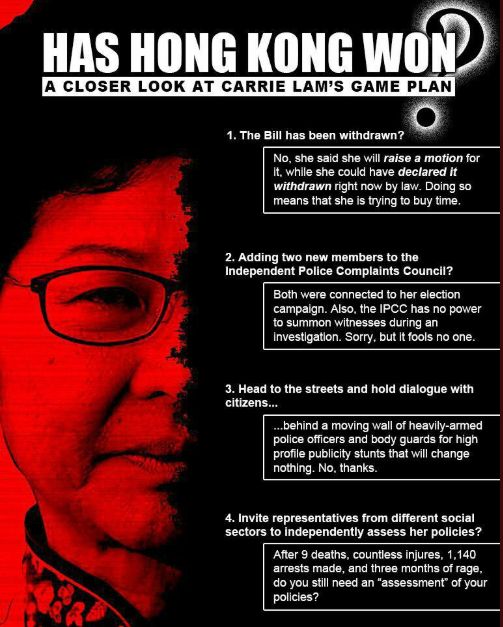
For updates click homepage here